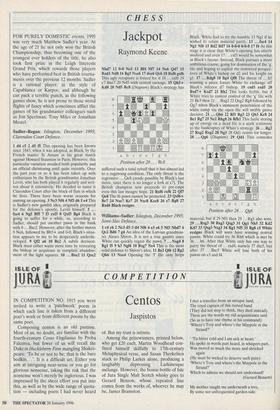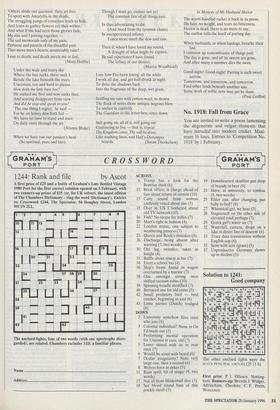ISLE OF 111 i ,,t).1,, ..,,, 1,,,,,,A I ISLE OF uRA
SINI 11 V11I 1WI1II%/11s11
COMPETITION
Centos
Jaspistos
IN COMPETITION NO. 1915 you were invited to write a 'patchwork' poem in which each line is taken from a different poet's work or from different poems by the same poet.
Composing centos is an old pastime. Most of us, no doubt, are familiar with the fourth-century Cento Virgilianus by Proba Falconia, but fewer of us will recall the Duke in Huckleberry Finn mangling Shakes- peare: 'To be or not to be; that is the bare bodkin... '. It is a difficult art. Either you aim at intriguing near-sense or you go for glorious nonsense, taking the risk that the nonsense won't merely be inglorious. I was impressed by the sheer effort you put into this, as well as by the wide range of quota- tion — including poets I had never heard
of. But my trust is infinite.
Among the prizewinners, printed below, who get f20 each, Martin Woodhead con- fined himself skilfully to 17th-century Metaphysical verse, and Susan Therkelsen stuck to Philip Larkin alone, producing a laughably depressing Larkinesque mélange. However, the bonus bottle of Isle of Jura Single Malt Scotch whisky goes to Gerard Benson, whose repeated line comes from the works of, whoever he may be, James Bramston.
I met a traveller from an antique land, The royal captain of this ruined band (They did not stop to think, they died instead). These are the words my old acquaintance said (So as to have one rhyme at his command): `Where's Troy and where's the Maypole in the Strand?'
'Tis bitter cold and I am sick at heart.'
He spoke in words part heard, in whispers part, Was moved so much the more and shrieked again (He must be wicked to deserve such pain): `Where's Troy and where's the Maypole in the Strand?'
Which to admire we should not understand!
(Gerard Benson) My mother taught me underneath a tree, By some not unfrequented garden-side: 'Others abide our question: thou art free To sport with Amaryllis in the shade, The struggling pangs of conscious truth to hide, And learn to gather flowers ere they wither.'
And what if she had seen those glories fade, My sins and I joining together - The sad memorials only of my pain, Portions and parcels of the dreadful past That move men's hearts, unutterably vain?
I run to death, and death meets me as fast.
(Mary Holtby) Under the wide and starry sky Where the bee sucks, there suck I, Beside the lake beneath the trees, Uncertain, coy and hard to please.
How doth the little busy bee?
He sucked me first and now sucks thee, And soaring disappears from view.
And did he stop and speak to you?
'The one thing I regret,' he said - For he on honey dew hath fed - We have no time to stand and stare On daily visits through the air.'
(Alanna Blake) When we have run our passion's heat (So spiritual, pure and fair) Though I must go, endure not yet The common fate of all things rare.
In thus adventuring to die (And freed from thy tyrannic chain) In unexperienced infancy I once more smell the dew and rain.
Then if, when I have loved my round, A draught of what might be expires, By sad experience I have found The fallacy of our desires.
(Martin Woodhead) I see how I've been losing: all the while I work all day, and get half-drunk at night To drive the shadows back Into the fragrance of the deep, wet grass, Stuffing my ears with cotton-wool, to drown The flock of notes those antique negroes blew To anchor in captivity
The Guardian in the letter-box, since dawn.
Still going on, all of it, still going on! Continuing to live — that is, repeat Thy Kingdom come, Thy will be done, Like washing-lines, and Hall's Distemper boards. (Susan Therkelsen) In Memory of My Husband Hector The warm handled racket is back in its press; Ills have no weight, and tears no bitterness. Hector is dead; there is no more to say; The curfew tolls the knell of parting day.
When husbands, or when lapdogs, breathe their last, I summon up remembrance of things past. The day is gone, and all its sweets are gone. And after many a summer dies the swan.
Good-night! Good-night! Parting is such sweet sorrow.
Tomorrow, and tomorrow, and tomorrow, Find other lands beneath another sun.
Some work of noble note may yet be done.
(Paul Griffin)
No. 1918: Fall from Grace
You are invited to write a poem lamenting the degenerate and vulgar elements that have intruded into modern cricket. Maxi- mum 16 lines. Entries to 'Competition No. 1918' by 1 February.



























































 Previous page
Previous page